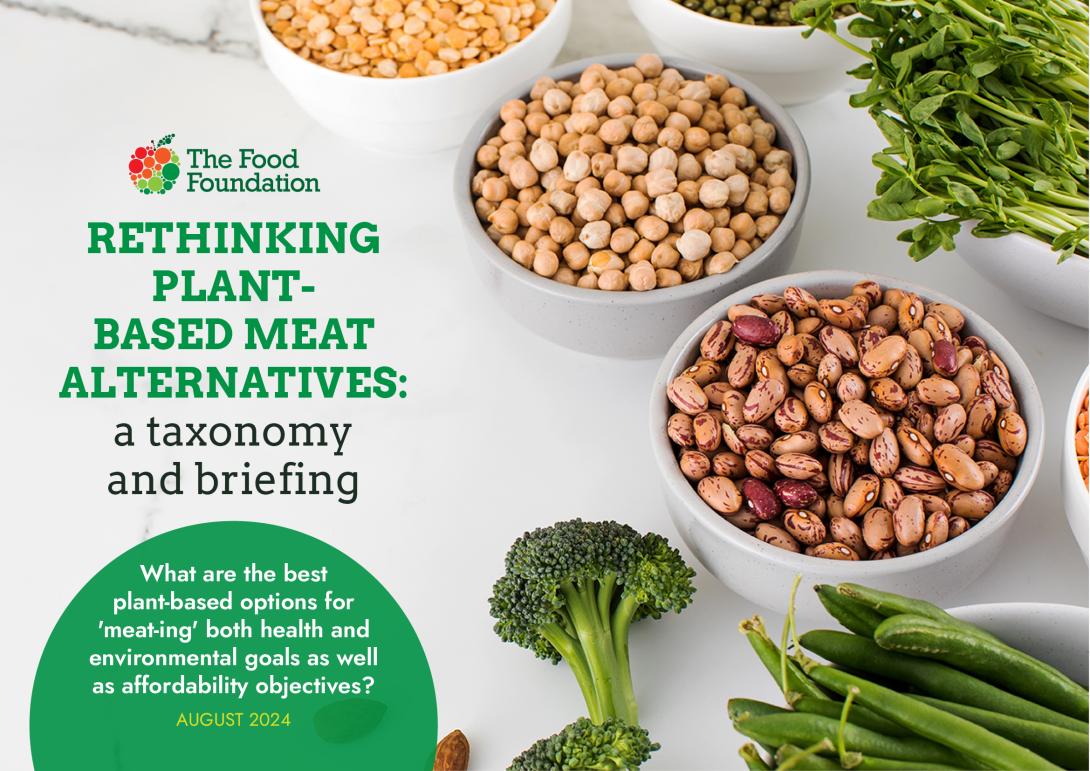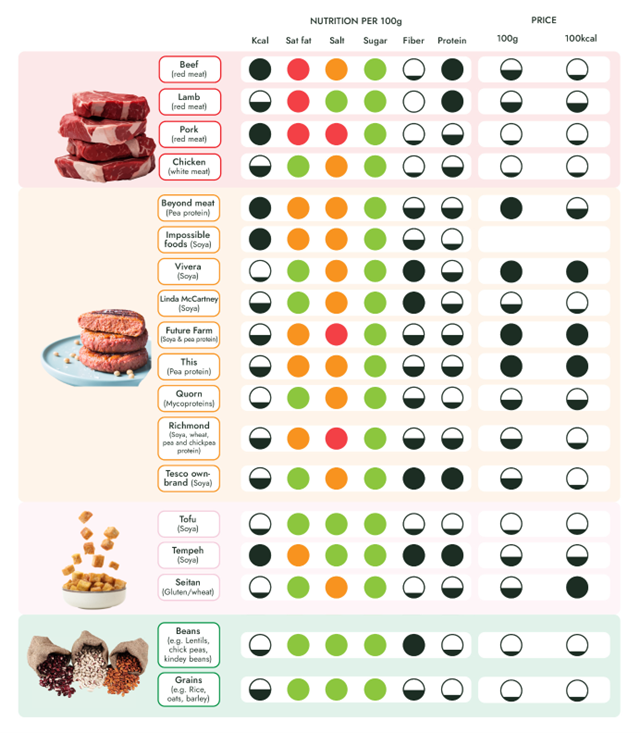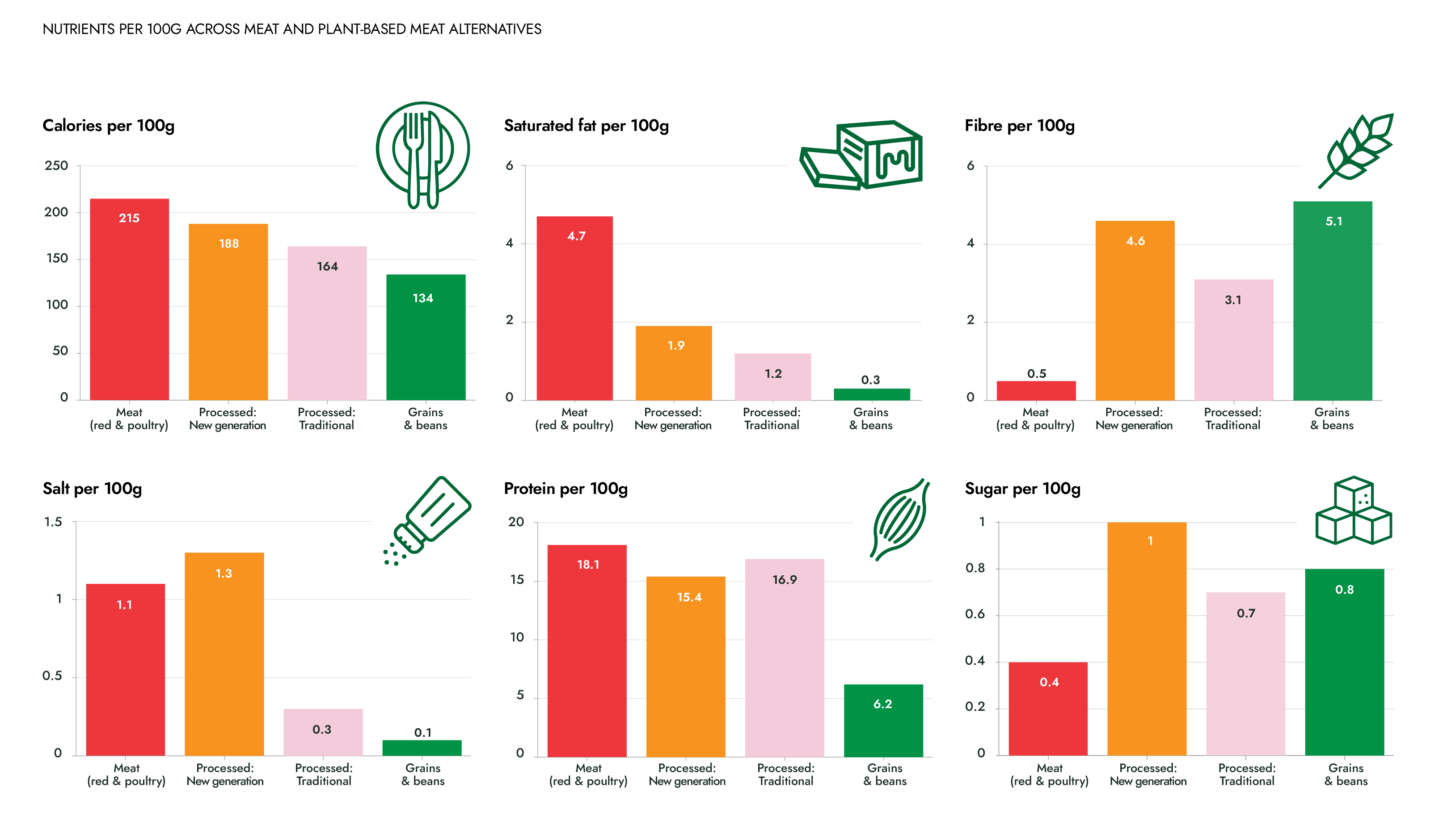28 August 2024
New report shows clear environmental and health benefits of eating whole plant foods over meat and processed alternatives

The Food Foundation has released a new report showing clear environmental and health benefits of eating whole plant foods over meat and processed meat alternatives
With barbecue season in full swing, many will be opting for veggie burgers in an attempt to eat more sustainably and improve their health.
But how much do we really know about the influx of plant-based meat alternatives that have appeared on supermarket shelves? And are some alternative proteins better for people and the planet than others?
A new report from The Food Foundation, published today, reveals the truth behind the marketing claims through in depth analysis of 68 different plant-based protein alternatives, examining their nutritional, environmental and price credentials and comparing them both to meat and each other.
The selected products included processed new generation plant-based meat alternatives (including Beyond Meat, THIS branded products, Quorn, Linda MacCartney, Vivera and retailer own-brand plant-based burgers), processed traditional plant-based meat alternatives (tofu, tempeh, seitan, historically eaten in areas such as Southeast Asia) and less processed plant food meat alternatives (beans and grains which are a natural source of protein, including some ready-to-eat and tinned bean and grain products).
The study found that:
- All plant-based meat alternative categories come with significantly reduced greenhouse gas emissions (GHGEs) and water footprints compared to meat
- All plant-based meat alternative categories contain fewer calories, lower levels of saturated fat, and higher levels of fibre on average compared to meat products
- There’s a wide variety of plant-based meat alternatives with differing nutrition and health profiles. The number of new generation alternatives (like Beyond Meat Nuggets) far exceeds that of more traditional options (like tofu).
- The proportion of ultra processed foods (UPFs) within each plant-based meat alternative category varies considerably – with all the new generation products qualifying as UPFs but a number of traditional, less processed plant-based alternatives available for consumers looking to reduce the amount of ultra-processed food in their diets.
- Less processed alternative proteins (beans and grains, which are a natural source of protein) deliver the best bang for buck on health and environment with lower amounts of saturated fat, calories and salt and the highest amount of fibre of all products. They are also the most affordable category.
- Processed plant-based meat alternatives are only marginally lower in protein relative to meat, despite public concerns about getting enough protein from plant-based diets.
- Processed new generation plant-based meat alternatives contain 18% more salt than meat, the highest level of salt of all three plant-based alternative categories, and three times as much salt as processed (traditional) plant-based meat alternatives like tofu have.
- Consumers pay a premium for more processed plant-based alternatives like tofu, Future Farm and THIS brand compared to meat despite their environmental benefits. The processed (new generation) alternative category is 73% more expensive per 100g than the meat category while the processed (traditional) category is 38% more expensive.



There are an increasing number of people changing their diets in order to play their part in tackling climate change and to be healthier. With livestock accounting for 15% of total greenhouse gas emissions globally, and the UK eating a third more meat than the global average, reducing meat consumption is a crucial part of this.
This new report clearly shows that all plant-based meat alternative categories come with significantly reduced greenhouse gas emissions (GHGEs) and water footprints compared to meat, so it is important that the trend towards more plant-based diets continues.
The report also shows, however, that the nutritional implications of shifting towards eating alternative proteins is mixed, depending on the type of alternative protein you are opting for.
A lot of the more recently developed processed meat alternative products are more likely to contain higher levels of salt than other alternative proteins and only a third are fortified with iron and vitamin B12 (as would be found in meat).
There is, therefore, scope for processed plant based meat alternatives to be fortified with the key vitamins and minerals we need for healthy diets where meat is a major contributor to intake, and for brands to reformulate to reduce salt content.
More traditional forms of processed plant-based meat alternatives, such as tofu, tempeh and seitan, were found to be less likely to be ultra-processed and contained much lower levels of salt and were lower in saturated fat than more recently developed plant-based alternatives.
However, despite being a healthier alternative on average to processed (new generation) plant-based alternatives, our analysis found a much smaller number of products and brands within this category available for consumers to buy.
While more processed plant-based meat alternatives can be a useful stepping stone for encouraging citizens to shift their diets, and come with significant environmental benefits, less processed alternatives, such as beans, offer the greatest number of health and environmental benefits as well as being affordable.
Rebecca Tobi, Senior Business and Investor Engagement Manager, said: "Despite increasing public concern about the healthiness of many plant-based meat alternatives we found a huge variety of options for consumers looking to eat less meat.
"While plant-based alternatives that mimic the taste of meat can play a really useful role in helping people to shift towards more plant rich diets and come with significant environmental benefits, alternative sources of protein to meat such as beans perform strongly compared to both meat and other plant-based meat alternatives.
"They are also the most affordable alternative to meat by quite some way. There is a huge opportunity in the UK to get people eating more beans, as an affordable, healthy and sustainable alternative protein source. They’re a win-win-win for environmental, health and equity outcomes."
Sofia Condes, Director of Investor Outreach, FAIRR Initiative, said: "This report shines a light on the clarity needed by investors on the possible health and environmental trade-offs involved in a transition to a more plant-based diet.
"FAIRR has been working on this topic at a global level, and our engagements target 20 of world’s largest food manufacturers and retailers who have a key role to play in shifting consumer behaviour.
"We recognise that country-level analysis and guidance such as this one focused on the UK market is instrumental in supporting investors, policymakers, corporates and consumers.”
Paul Newnham, CEO & Chief Beans Officer, SDG2 Advocacy Hub, said: "Through the Beans is How campaign, we're working to double global bean consumption by 2028.
"Beans are a simple, affordable climate smart solution to our nutritional, health and environmental challenges and there's huge potential for us to grow and eat more beans.
"Over the past couple of years, we've seen increasing numbers of chefs championing beans in their work and on menus and given their versatility and use in so many different cuisines, we're excited to see more people waking up to the power of beans."
NOTE TO EDITORS
Please contact: Juliet Grant on 07929075489 or email juliet.grant@foodfoundation.org.uk
SOCIAL MEDIA
Twitter: @Food_Foundation
Instagram: food.foundation
The Food Foundation Podcast
For more in-depth analysis and lived experience listen to our podcast
ABOUT THE FOOD FOUNDATION
The Food Foundation is a charity working to influence food policy and business practice, shaping a sustainable food system which makes healthy diets affordable and accessible for all. We work in partnership with researchers, campaigners, community bodies, industry, investors, government and citizens to galvanise the UK’s diverse agents of change, using surprising and inventive ideas to drive fundamental shifts in our food system. These efforts are based on the continual re-evaluation of opportunities for action, building and synthesising strong evidence, convening powerful coalitions, harnessing citizens’ voices and delivering impactful communications.
Registered Charity Number 1187611.


